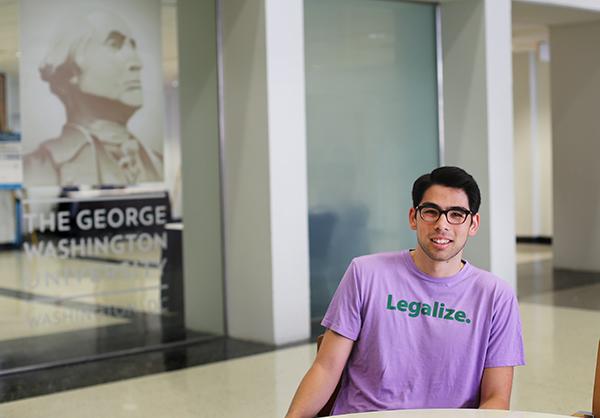A new organization is looking to recruit GW students for D.C.’s marijuana legalization fight this fall.
Marijuana legalization will be on the ballot for D.C. voters, and the 25-member campus group, Students for Sensible Drug Policy, is hoping that after success on Election Day, it can convince GW to change its policies toward drug use on campus.
Initiative 71, which will appear on the November ballot, would legalize up to 2 ounces of marijuana for residents over the age of 21. If D.C. voters support the initiative, Students for Sensible Drug Policy will lobby GW to make consequences for marijuana use more similar to the punishments for alcohol violations.
GW’s chapter of the national organization will host events this semester, such as setting up tables in Kogan Plaza and the Marvin Center next week to register students to vote in D.C., to inform students about the ballot initiative and what members hope it will mean for campus.
Students for Sensible Drug Policy will also host a discussion with Howard Wooldridge, who works with members of Congress to lobby for drug legalization, and Malik Burnett, an organizer for the Drug Policy Alliance.
Nick Watkins, president of the GW chapter of Students for Sensible Drug Policy, said the group promotes policies that view drugs as a “public health issue, not a criminal issue.”
“So essentially, the major goal would be to end the war on drugs,” Watkins said.
Students caught with more than one ounce of marijuana face possible suspension. First-time offenders must pay a $50 dollar fine, while second-time offenders pay $100. After a third offense, the student must attend a disciplinary hearing to “determine the viability of the student’s remaining at the University,” according to the code of student conduct.
Watkins said GW would only be likely to change the code if Students for Sensible Drug Policy gathers support from student groups across campus.
“We would like to create a strong, student coalition to challenge the University on this policy, and see if they would be willing to change this policy, and hopefully that would force them to make a change,” he said.
The University will continue its ban on marijuana use and possession on campus to comply with federal drug laws, University spokesman Kurtis Hiatt said. If officials abolished the ban, the University could risk losing federal funding.
When D.C. decriminalized possession of small amounts of marijuana in July, the University did not make any changes to its disciplinary policies. The Center for Alcohol and other Drug Education has already started to inform students about the implications of decriminalization with flyers in residence halls, outlining that while marijuana is decriminalized in D.C., it does not affect GW’s policies.
Still, Students for Sensible Drug Policy’s policy and legislative affairs director, Greg Gaffney-Bills, said the group would push the University to alter its disciplinary procedures if the measure passes on Election Day.
“Once it is legalized, we don’t think there is any excuse for the University to continue punishing students who do something that frankly is no worse than drinking alcohol,” he said.
Gaffney-Bills said some administrators have told the group that they were excited students were advocating for change.
“They say ‘Oh, this is a great idea, we don’t have anything like this on campus yet, I totally think this is a cool thing what you’re doing,'” he said. “I mean obviously, it is kind of risky to come out and vocally oppose school policy.”
The group is also hosting a “fireside chat” on Oct. 15 in collaboration with the Roosevelt Institute on the “War on Drugs.”
The national Students for Sensible Drug Policy created a Campus Drug and Alcohol Policy Gradebook, in which the organization grades universities across the country based on their campus drug policy.
GW earned a C because of its focus on punishment after a drug or alcohol violation rather than educational services, and because the University’s amnesty policy protects students from disciplinary for their first violation of the alcohol policy but permanently documents a first-time marijuana offense.
Other D.C. universities, such as American and Georgetown, received A and B grades respectively, because of their case-by-case approach to drug and alcohol incidents.
Similar schools like Boston University and the University of Miami were also given C ratings, but most other schools similar to GW were given a B, like Tufts and Northwestern universities.







